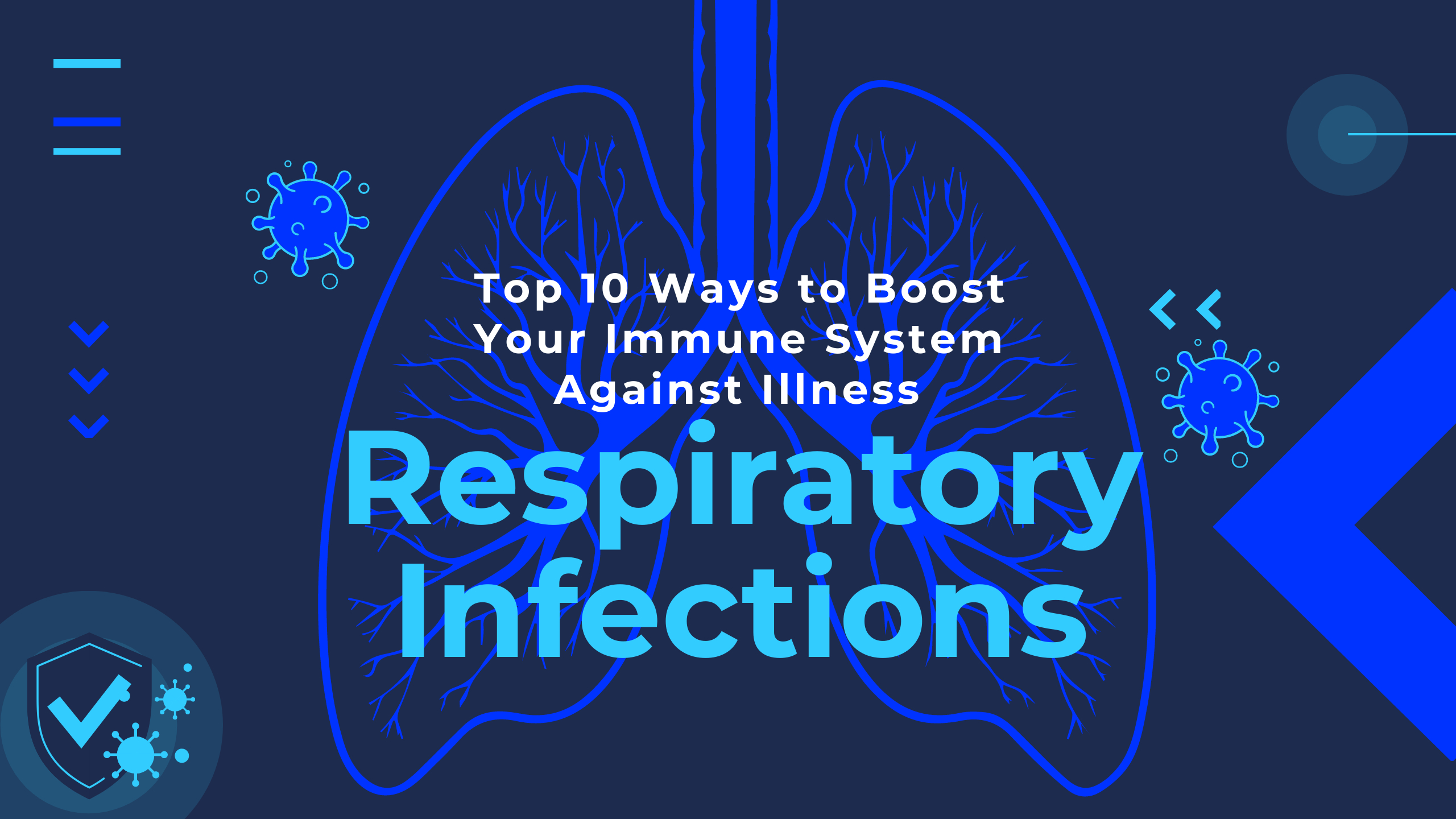Respiratory Infections: Top 10 Ways to Boost Your Immune System Against Illness
Respiratory infections, encompassing conditions like the common cold, influenza, and even pneumonia, are prevalent and can impact anyone at any time, especially during colder months or flu season. Protecting yourself and boosting your immune system to combat these illnesses can help you stay healthy and reduce the severity and duration of symptoms.
In this comprehensive guide, we’ll dive into the top 10 scientifically-backed strategies for fortifying your immune system against respiratory infections, helping you reduce your susceptibility and enhance your overall health.
This article is for informational purposes only and does not constitute medical advice. Always consult a qualified healthcare professional before starting any new health practices, especially if you have a respiratory condition, are taking medication, or have underlying health concerns.
Understanding Respiratory Infections and the Immune System

Respiratory infections are caused by various pathogens, including viruses, bacteria, and fungi, and can range from mild (like the common cold) to severe (such as bronchitis and pneumonia).
The immune system is your body’s primary line of defense against these pathogens, working tirelessly to prevent infection or reduce its impact.
Our body has two primary types of immunity:
- Innate immunity is the first line of defense and reacts immediately to any invader.
- Adaptive immunity is more specialized and develops over time, creating antibodies against specific pathogens you’ve encountered previously.
Keeping your immune system strong is essential in reducing both the frequency and severity of respiratory infections. Let’s explore 10 effective, evidence-based ways to boost your immune system against these infections.
Top 10 Ways to Boost Your Immune System Against Respiratory Infections
1. Prioritize Quality Sleep

Good sleep is fundamental to a strong immune system, serving as the time when the body repairs itself and prepares to defend against potential infections. During sleep, the immune system releases cytokines—proteins that specifically target infection and inflammation to help the body fight off harmful pathogens, including those responsible for respiratory infections.
Cytokines not only combat current infections but also support long-term immune health by maintaining a balance in the immune response, ensuring it is neither too weak nor overly reactive.
Read More: Get-enough-sleep
Numerous studies highlight the link between poor sleep and reduced immune function. Individuals who consistently get fewer than 6 hours of sleep per night have shown to have a weaker immune response, with reduced production of both antibodies and immune cells needed to combat infections.
This makes them more susceptible not only to catching colds, flu, and other respiratory infections but also to experiencing more severe symptoms when they do get sick.
Read More: Why Do We Sleep? Unraveling the Science Behind a Good Night’s Rest
How to Improve Sleep Quality:
- Aim for 7-9 hours of uninterrupted sleep each night.
- Establish a regular sleep schedule, going to bed and waking up at the same time.
- Create a restful environment: a cool, dark room without electronic devices.
2. Maintain a Balanced Diet Rich in Nutrients

A balanced diet is a cornerstone of immune health, directly impacting the body’s ability to fight off respiratory infections and maintain overall wellness.
By providing the body with an array of essential nutrients, a well-rounded diet ensures that every cell and system—including the immune system—is well-equipped to protect against illness.
A balanced diet doesn’t only mean eating the right quantities of food but also focusing on a mix of macronutrients (carbohydrates, proteins, and fats) and micronutrients (vitamins and minerals), each of which plays a unique role in supporting immune function.
Key Nutrients for Immune Health:
- Vitamin C: Found in citrus fruits, bell peppers, and strawberries, vitamin C enhances immune cell function.
- Vitamin D: Critical for respiratory health, vitamin D deficiency is linked with increased respiratory infections. Natural sources include sunlight, fortified foods, and supplements.
- Zinc: Found in nuts, seeds, and meats, zinc supports the immune system’s ability to respond to pathogens.
- Antioxidants: Fruits and vegetables rich in antioxidants (like berries, leafy greens, and broccoli) help reduce oxidative stress, which weakens immunity.
Incorporating these nutrients into your diet supports immune health, reducing your likelihood of contracting respiratory infections.
3. Engage in Regular Exercise

Engaging in regular exercise is one of the most effective ways to support immune function, reduce inflammation, and maintain respiratory health. Moderate physical activity has a positive impact on nearly every system in the body, from enhancing cardiovascular health to supporting mental well-being.
Importantly, research has shown that exercise boosts immune surveillance—the body’s ability to detect and eliminate harmful pathogens at an early stage, reducing the likelihood and severity of respiratory infections.
Read More: How to Start a Workout Routine: 10 Proven Ways to Build Consistency
Recommended Exercise Routine:
- Aim for 150 minutes of moderate exercise (like brisk walking or swimming) per week.
- Include strength training exercises twice a week to support overall health and immune function.
- Avoid over-exertion, as extreme exercise can temporarily suppress the immune system.
4. Stay Hydrated

Staying hydrated is essential for overall health, and it plays a particularly vital role in supporting the immune system and respiratory health. Proper hydration ensures that every cell in the body, including immune cells, functions optimally.
When the body is well-hydrated, it maintains robust mucous membranes in the respiratory tract, which act as a physical barrier against pathogens, trapping viruses, bacteria, and other harmful particles before they can invade the body.
This barrier is one of the first lines of defense against respiratory infections, making adequate hydration crucial, especially during cold and flu season.
Hydration Tips:
- Aim for at least 8 glasses (64 ounces) of water daily, adjusting for your activity level and climate.
- Include hydrating foods like fruits and vegetables, which provide both water and essential vitamins.
5. Manage Stress Effectively

Effectively managing stress is essential for maintaining a strong immune system and reducing vulnerability to respiratory infections. Chronic stress has a well-documented impact on immune health, making it harder for the body to fend off pathogens.
When stress becomes prolonged, it triggers the release of cortisol—a stress hormone that, while beneficial in short bursts, can suppress immune cell production and function when elevated over time. High cortisol levels inhibit the production and activity of immune cells like lymphocytes and natural killer cells, which play crucial roles in identifying and destroying pathogens.
Consequently, stress can weaken the body’s natural defenses, increasing the likelihood of respiratory infections.
Read More: Manage Stress: 7 Effective Techniques to Reduce Daily Tension
Stress Management Techniques:
- Mindfulness Meditation: Practicing 10-20 minutes of daily meditation can reduce stress significantly.
- Physical Activity: Exercise is a natural stress reliever, releasing endorphins that improve mood.
- Social Support: Connecting with friends or family can reduce stress levels and strengthen immunity.
6. Practice Good Hygiene

Practicing good hygiene is one of the most effective strategies to prevent respiratory infections, as it directly reduces the likelihood of coming into contact with harmful pathogens. Many respiratory infections, including the common cold, flu, and other viruses, spread through contaminated surfaces or droplets in the air.
These pathogens can survive on surfaces for hours to days, making it easy for them to spread through common touchpoints. Regularly incorporating good hygiene habits not only protects you but also minimizes the spread of infections to others.
Read More: Good Hygiene for Kids: Teaching Essential Habits Early
Effective Hygiene Practices:
- Handwashing: Wash your hands with soap and water for at least 20 seconds, especially after being in public places.
- Face Masks: Wearing masks in crowded places can reduce the transmission of respiratory infections.
- Avoid Touching Your Face: Pathogens can enter your body through your eyes, nose, or mouth.
7. Incorporate Herbal and Nutritional Supplements

Adding herbal and nutritional supplements to your daily routine can provide an extra layer of immune support, particularly when combined with a balanced diet and healthy lifestyle. Many herbs and natural supplements contain powerful antioxidants, anti-inflammatory compounds, and vitamins that enhance immune function and protect against respiratory infections.
However, it’s important to remember that supplements work best as a complement to, rather than a replacement for, a nutrient-rich diet and other healthful habits.
Read More: Herbal Remedies: 10 Effective Ways to Boost Your Immune System Naturally
Recommended Supplements:
- Elderberry: Known for its antiviral properties, elderberry can help prevent or reduce the severity of respiratory infections.
- Echinacea: This herb stimulates immune function and is particularly effective when taken at the onset of symptoms.
- Propolis: Produced by bees, propolis has antimicrobial properties that can enhance immune defense.
Read More: 15 Herbal Remedies for Anxiety: A Comprehensive Guide
8. Limit Alcohol and Avoid Smoking

Limiting alcohol consumption and avoiding smoking are critical steps in maintaining a robust immune system and promoting overall respiratory health.
Both excessive alcohol intake and smoking can have significant negative effects on the body’s ability to fight off infections, making individuals more susceptible to respiratory illnesses.
Tips for Reducing Consumption:
- Limit alcohol to moderate levels—no more than one drink per day for women and two for men.
- Seek support or counseling if smoking cessation is challenging; numerous resources are available for those who want to quit.
9. Consider Probiotics for Gut Health

Gut health plays a crucial role in maintaining a robust immune system, as approximately 70% of the body’s immune cells are housed in the gut.
This close relationship between gut health and immune function highlights the importance of nurturing a balanced gut microbiome—the diverse community of microorganisms residing in the digestive tract.
Probiotics, which are live beneficial bacteria found in various fermented foods and supplements, can significantly support gut health and, consequently, overall immune function.
Read More: Digestive Health 101: How Your Gut Works and Why It Matters
Top Probiotic Foods:
- Yogurt: Contains live cultures that can boost immunity.
- Kefir: A fermented milk drink with a high concentration of probiotics.
- Kimchi and Sauerkraut: Fermented vegetables that offer both probiotics and antioxidants.
10. Embrace Regular Check-Ups and Preventive Care
Embracing regular check-ups and preventive care is a fundamental aspect of maintaining a healthy immune system and overall well-being. Preventive care encompasses a variety of health practices aimed at detecting potential health issues before they develop into serious conditions.
By prioritizing these practices, individuals can take proactive steps to enhance their health, manage chronic conditions, and reduce their risk of respiratory infections.
Preventive Health Actions:
- Schedule annual physical exams and respiratory assessments.
Here’s a simple table that organizes the key aspects of scheduling annual physical exams and respiratory assessments:
| Check-Up Type | Frequency | Key Focus Areas | Benefits |
|---|---|---|---|
| Annual Physical Exam | Once per year | General health, vital signs, blood tests | Early detection of health issues, personalized care |
| Respiratory Assessment | Once per year | Lung function tests, breathing evaluation | Identifies potential respiratory issues, improves lung health monitoring |
| Immunization Review | During annual exam | Flu, pneumonia, COVID vaccines | Updates necessary vaccines to prevent respiratory infections |
| Lifestyle & Risk Assessment | During annual exam | Smoking, alcohol, fitness, diet | Provides tailored lifestyle recommendations |
| Follow-Up Appointments | As needed | Any respiratory concerns or symptoms | Ensures timely intervention for ongoing respiratory health |
- Keep up-to-date with vaccinations recommended by health professionals.
Here’s a table to outline key vaccinations recommended for respiratory health, including frequency and benefits:
| Vaccine | Recommended Frequency | Purpose | Benefits |
|---|---|---|---|
| Flu Vaccine | Annually | Protects against seasonal influenza | Reduces risk of severe respiratory infections |
| Pneumonia Vaccine | Once, with possible boosters | Prevents bacterial pneumonia | Lowers incidence of serious lung infections |
| COVID-19 Vaccine | Initial series + recommended boosters | Prevents severe COVID-19 illness | Helps protect lungs and overall respiratory health |
| Tdap (Tetanus, Diphtheria, Pertussis) | Every 10 years | Protects against whooping cough and respiratory complications | Reduces risk of respiratory complications |
| Shingles Vaccine | Once for adults over 50 | Protects against shingles, which can impact immunity | Supports immune function, lowering infection risk |
- Address underlying health conditions like asthma or allergies, which can increase respiratory infection risk.
Here’s a table outlining steps for managing underlying health conditions, such as asthma and allergies, to reduce the risk of respiratory infections:
| Condition | Management Strategies | Frequency | Benefits |
|---|---|---|---|
| Asthma | Use prescribed inhalers, follow asthma action plan, monitor symptoms | Daily and as needed | Reduces inflammation, prevents asthma flare-ups, and lowers infection risk |
| Seasonal Allergies | Take antihistamines, avoid allergens, use air purifiers | Seasonally or as needed | Minimizes allergy symptoms, reduces airway irritation, and enhances respiratory protection |
| Chronic Bronchitis | Quit smoking, use prescribed medications, practice breathing exercises | Ongoing | Prevents worsening of symptoms, supports lung function, and reduces infection susceptibility |
| COPD (Chronic Obstructive Pulmonary Disease) | Follow treatment plan, avoid pollutants, attend pulmonary rehab | Regular follow-ups | Improves breathing capacity, reduces respiratory stress, and limits infection risk |
| Obstructive Sleep Apnea | Use CPAP machine, maintain healthy weight, monitor sleep quality | Nightly and routine check-ups | Enhances breathing during sleep, prevents complications, and supports immune health |
Latest Research on Boosting Your Immune Defense Against Respiratory Infections
As someone who’s spent decades weathering colds and flus, I find the newest research both encouraging and wonderfully practical:
needle‑free nasal vaccines are honing in on our mucosal barriers to block viruses before they really take hold; regular vitamin D supplementation (800–2,000 IU daily) has been shown to cut acute respiratory infections, especially for those with low levels; and a colorful, whole‑food diet rich in vitamins A, C, E and zinc not only fuels our cells but also nurtures the gut‑lung microbiome axis.
Gentle, consistent exercise—think brisk 30‑minute walks a few times a week—boosts circulation of immune cells without overwhelming your system, while 7–9 hours of quality sleep and simple stress‑management rituals like deep breathing or journaling keep cortisol in check.
Adding a daily multi‑strain probiotic and beta‑glucan–rich foods (oats, mushrooms) may further fine‑tune your immune response, and don’t underestimate the power of saline nasal rinses, good ventilation or HEPA filtration to lower pathogen load in your environment. By weaving these tenets together—vaccines, nutrients, habits, supplements and clean air—you build a resilient, adaptable defense that truly honors the wisdom of a lifetime of living well.
Conclusion: Strengthening Your Defense Against Respiratory Infections
Boosting your immune system against respiratory infections requires a holistic approach, encompassing good sleep, a balanced diet, regular exercise, effective stress management, and preventive care.
Integrating these 10 strategies can fortify your body’s natural defenses, helping you stay healthier and recover faster if you do fall ill.
By making these practices a consistent part of your routine, you can protect yourself and enjoy a healthier, more resilient life. Remember, small changes today can lead to significant improvements in your immune health and overall well-being, keeping respiratory infections at bay.
FAQ
What are respiratory infections, and how do they affect the immune system?
Respiratory infections are illnesses that affect the airways and lungs, including the common cold, influenza, pneumonia, and bronchitis. These infections can significantly impact the immune system by overwhelming it with pathogens, which can lead to inflammation and reduce the body’s ability to fight off other infections. A healthy immune system is crucial for quickly identifying and combating these pathogens, helping to minimize symptoms and recovery time.
How can I tell if I have a respiratory infection?
Common symptoms of respiratory infections include cough, sore throat, fever, shortness of breath, fatigue, and congestion. If you experience severe symptoms or have difficulty breathing, it is essential to seek medical attention promptly. Your healthcare provider can perform tests, such as a physical exam or laboratory tests, to determine the presence of an infection and recommend appropriate treatment.
How does sleep impact my immune system?
Quality sleep is essential for a strong immune response. During sleep, the body produces cytokines, proteins that target infection and inflammation. Studies show that individuals who do not get enough sleep are more susceptible to illnesses. Aim for 7-9 hours of quality sleep each night to support immune health.
What dietary changes can I make to boost my immune system?
A balanced diet rich in nutrients is vital for immune health. Focus on incorporating a variety of fruits, vegetables, whole grains, lean proteins, and healthy fats into your meals. Key vitamins and minerals, such as vitamin C, vitamin D, zinc, and antioxidants, play a crucial role in enhancing immune function and protecting against infections.
Is exercise really beneficial for immune health?
Yes! Regular moderate exercise has been shown to improve immune function, decrease inflammation, and enhance respiratory health. It promotes good circulation, allowing immune cells to move freely throughout the body. Aim for at least 150 minutes of moderate exercise per week to enjoy its immune-boosting benefits.
How much water should I drink to stay hydrated?
Adequate hydration is crucial for immune health, particularly for maintaining moist mucous membranes in the respiratory tract. A general guideline is to drink at least 8-10 cups (64-80 ounces) of water daily. However, individual hydration needs may vary based on factors such as age, activity level, and climate, so listen to your body and adjust accordingly.
What are some effective stress management techniques?
Managing stress effectively is essential for maintaining a healthy immune system. Techniques such as mindfulness meditation, yoga, deep breathing exercises, and regular physical activity can help reduce stress levels. Additionally, ensuring adequate social support and engaging in hobbies can improve overall well-being.
Are there specific vaccines I should get to prevent respiratory infections?
Yes, vaccines play a crucial role in preventing respiratory infections. Key vaccinations include the annual flu shot, the pneumonia vaccine, and, if applicable, the COVID-19 vaccine. Consult with your healthcare provider about your vaccination history and which vaccines are appropriate for you.
Can herbal supplements really help boost my immune system?
Certain herbal supplements, such as echinacea, elderberry, and garlic, may offer immune-supporting benefits. However, it is essential to remember that supplements should not replace a balanced diet and a healthy lifestyle. Always consult with a healthcare professional before starting any new supplement regimen.
What role do probiotics play in immune health?
Probiotics are beneficial bacteria that help maintain a healthy gut microbiome, which is crucial for immune function. A balanced gut microbiome can enhance immune responses and reduce the risk of infections. Incorporating probiotic-rich foods, such as yogurt, kefir, and fermented vegetables, into your diet can support gut health.
How often should I have regular health check-ups?
The frequency of health check-ups can vary based on individual health needs and age. Generally, adults should have a comprehensive check-up at least once a year. However, those with chronic health conditions or specific risk factors may require more frequent visits. Discuss your health history with your healthcare provider to determine the best schedule for you.
What should I do if I suspect I have a respiratory infection?
If you suspect you have a respiratory infection, it is essential to monitor your symptoms. If symptoms worsen or you have difficulty breathing, seek medical attention promptly. Your healthcare provider can perform tests to diagnose the infection and recommend an appropriate treatment plan.






